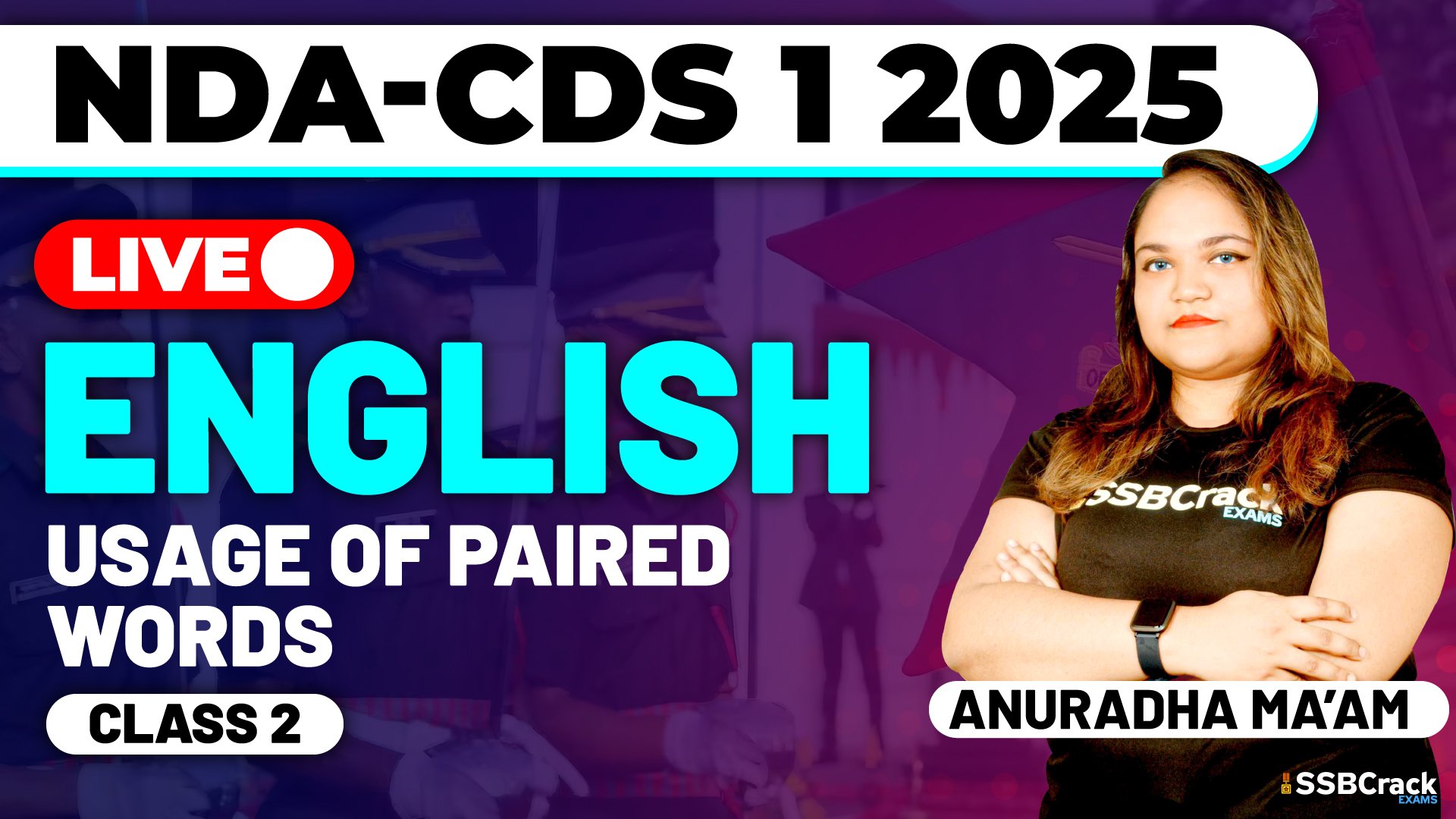In the competitive landscape of NDA and CDS exams, mastering the English language section is vital for securing a high score. One particularly challenging yet rewarding topic is the Usage of Paired Words. This topic tests candidates’ ability to distinguish between words that look or sound similar but carry different meanings. A strong grasp of vocabulary, especially homonyms, is essential for navigating these questions effectively.
Directions: In the following questions a pair of similar sounding words is provided. You are required to select the option that most appropriately describes the meaning of both the words and mark your response on the Answer Sheet accordingly.
Q) Perspicacity and Perspicuity
(a) Perspicacity means ability to discern and Perspicuity means lucidity of expression
(b) Perspicacity means lucidity of expression and Perspicuity means ability to discern
(c) Perspicacity means tenacity and Perspicuity means lucidity of expression
(d) Perspicacity means ability to discern and Perspicuity means tenacity
Ans. (a)
Q) Who’s and Whose
(a) Who’s means who are and Whose means referent of house
(b) Who’s means who was and Whose means possessive pronoun
(c) Who’s means possessive pronoun and Whose means contraction
(d) Who’s means who is and Whose means belonging to or associated with which person
Ans. (d)
Q) Their and There
(a)Their means belonging to people or things previously mentioned and There means in, at, or to that place or position.
(b)Their means in, at, or to that place or position and There means belonging to people or things previously mentioned.
(c)Their means to go somewhere and There means being perplexed.
(d)Their means to cast away and There means a place
Ans. (a)
Q) Loose and Lose
(a) Loose means to go awry and Lose means to misplace something
(b) Loose means to be vulgar and Lose means to mislead
(c) Loose means to misplace something and Lose means not tight
(d) Loose means not tight and Lose means to misplace something
Ans. (d)
Q) Gaff and Gaffe
(a) Gaff means helmet and Gaffe means passing something
(b) Gaff means hook and Gaffe means faux pas
(c) Gaff means credible and Gaffe means faux
(d) Gaff means to be away and Gaffe means faux pas
Ans. (b)
For more, check out NDA-CDS 1 2025 Exam English Live – Usage of Paired Words – Class 2
Why Focus on Usage of Paired Words?
- Understanding Homonyms:
Homonyms are words that have the same pronunciation but different meanings or spellings. Examples include bear (an animal) and bear (to endure), or affect (verb) and effect (noun). Confusing these can completely change the meaning of a sentence, making accuracy crucial. - Relevance in Exam Questions:
Questions from this topic are commonly presented as fill-in-the-blank or multiple-choice questions. They assess not just vocabulary but also a candidate’s ability to apply contextual knowledge. - Real-life Application:
Beyond exams, understanding paired words enhances written and spoken communication. This skill is particularly beneficial for future officers who must convey precise information.
Key Challenges Candidates Face
- Similar Sound and Appearance: Words like stationary (not moving) and stationery (writing materials) are easily confused.
- Contextual Interpretation: Selecting the correct word often depends on subtle cues within a sentence, requiring both attention to detail and a broad vocabulary.
- Limited Exposure: Without regular practice, it’s easy to overlook the nuances that differentiate these word pairs.
Highlights from Usage of Paired Words Class 2
In Usage of Paired Words Class 2, we focused on equipping candidates with the skills necessary to tackle these questions confidently:
- Interactive MCQ Sessions: Candidates engaged in solving carefully selected questions designed to mirror the exam’s difficulty level.
- Practical Application: Each question was contextualized, helping candidates understand how word choices impact meaning.
- Vocabulary Building: Detailed explanations provided after each question helped clarify subtle differences between homonyms and similarly spelled words.
- Exam Strategies: We discussed techniques such as identifying root words and understanding prefixes and suffixes to deduce meanings quickly.
Why This Topic Matters in NDA & CDS Exams
The Usage of Paired Words topic is more than a vocabulary test; it assesses logical thinking and attention to detail. Here’s why excelling in this area is crucial:
- High Scoring Potential: With proper preparation, these questions can be relatively straightforward, offering a valuable opportunity to secure marks.
- Tests Practical Language Skills: The ability to differentiate between paired words reflects a deeper understanding of the English language, which is essential for clear communication.
- Enhances Other Skills: Mastery of this topic improves performance in related areas such as sentence completion and error detection.
Effective Preparation Strategies
- Create Word Lists: Maintain a notebook of commonly confused word pairs with their meanings and usage in sentences.
- Practice Context-Based Questions: Regularly solve exercises that place paired words in different contexts to strengthen your understanding.
- Use Mnemonics: Develop memory aids to remember differences between similar words. For example, “stationery has an e for envelopes.”
- Review Past Papers: Analyze previous years’ questions to identify patterns and frequently tested pairs.
Conclusion
The Usage of Paired Words is a critical component of the English section in NDA and CDS exams. It tests not only vocabulary but also the ability to interpret meaning based on context—a skill that future defense officers must master. Through focused sessions like Usage of Paired Words Class 2, candidates can develop a solid foundation in this topic, ensuring they approach the exam with confidence. With consistent practice and strategic preparation, success in this area is well within reach.







